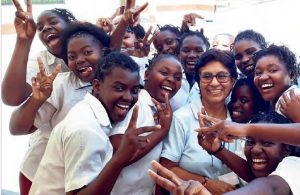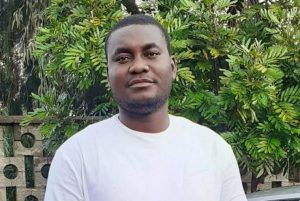Forty years of missionary life in Khartoum (Sudan). His work for the youth. His Club. Living close to the people.
Brother Michele Sergi was born on 20 April 1910, in Galliano del Capo, southern Italy. From childhood, he felt a desire to give himself to others. This was not just a desire he could not understand. An encounter with a missionary opened his eyes to the great missionary option. One thing stood in his way: his schooling. Michele had only finished primary school. The missionary reminded him that “missionaries are not all priests; some are Brothers who preach the Gospel with the work of their hands, building schools and churches or teaching Africans how to farm the land…”.
Aged nineteen, he entered the Comboni Missionary novitiate in Venegono on 28 October, 1929. He received the religious habit on 20 April 1930 and took first vows on 8 May 1932. He then served for four years in Italy and in December 1936 Bro. Michele was at last allowed to go to Africa. His destination was the great city of Cairo, in Egypt. It was there that on 8 May 1938, he pronounced perpetual vows.
In 1949 Bro Michele Sergi was sent to Khartoum as “The Brother in charge of maintenance at Comboni College”. In Khartoum, a city inhabited mostly by Arabs, there were also some black people from the south, the majority of whom were very poor and marginalised.
Bro. Michele would spend forty years as a missionary. As soon as he arrived, he organised a team of workers mainly from among the young men from the south who had come looking for work. He began teaching them bricklaying, carpentry and mechanics. In a short time, some of them became skilled workers, plumbers, carpenters and mechanics. He was putting into practice the human promotion that is part of the mission.
In the two years 1965-1966, Bro. Sergi set up a sports-field close to the airport and built storehouses, and a buffet with toilets as well as basketball and volleyball courts in cement; he also assisted in the construction of two laboratories for chemistry and physics; in 1974, he built garages for the coaches and lorries of the school, a dispensary at Hellat with a treatment room, an office and a store. Those were years filled with activities which he carried out with his group of workers whom he served outside working hours.
Bro. Michele’s relationship with his workers was one of real friendship. Once the day’s work was ended, he would gather them for some catechism lessons but mostly just to “be together”. His goodness towards all was admirable; he knew how to listen and never rushed into decisions but always consulted his workers whom he greatly trusted. His workers liked this way of doing things and felt fully involved in the work and felt responsible for it.
He gradually expanded his contacts and many people would come to him when they needed something. Bro. Michele listened, asked questions and gave his advice just like one of their very own.
Meanwhile, the Sudan was writing a new page in its bloody history. Immediately after independence, (1 January 1956), the skirmishes began, especially in the south. Similar clashes also occurred in the north. Unmitigated persecutions followed of the black people who came from the south to the north.
Bro. Sergi grasped that it the time had come to change tactics in his apostolate, to do something new for the many people coming to the city totally unprepared, with no economic resources, housing or work… It was a desperate situation. It was this emergency that gave rise to what became known as the “Sergi Miracle”. It was this miracle” that brought into the open the guiding principles of this brother’s spirituality: trust in God, apostolic zeal and love for the poorest and most oppressed.
The Club came into being. It was what was called in the local language “nadi” (Club). Soon after building the new Catholic Club close to the airport, Bro. Michele took over the old club in the city centre, just 300 metres from Comboni College. This club became the meeting-place for Christian workers with an attendance of about a thousand people every evening.
At the end of his work each day, which usually lasted from 7 am to 3 pm, Bro. Sergi would put on his white cassock and go to the “nadi”.
Literacy lessons and religious instruction, school lessons, prep-school and evening school were crammed into a very limited space with amazing order and functionality. Even today, nobody has yet discovered the secret of such success. Bro. Sergi was a great worker, a perfect organiser and a man of deep prayer. He always encouraged others and, above all, gave good example as a man of God and a brother to all.
As the leader of the club, he had his own personal method: he stimulated initiatives and shared responsibility, which resulted in many activities being run by the participants themselves. All he did was to confirm, listen and encourage others.
Bro. Sergi’s workers and many others who worked in the city gathered often at the club where they could find a comfortable place to sit and chat.
Those who wanted to could sit and read (there were plenty of seats and electric light); anyone who wanted to could just sit and chat freely; those who wanted to learn could attend school. There were lessons in Arabic, English, Arithmetic, with different grades.
Bro. Sergi was especially careful to have the smaller children attend lessons after which he would send them to ordinary schools. The older children learned how to read and write which meant they were no longer illiterate. There was no lack of catechism lessons, even though the centre was open to all, whether Christian or not.
With the Christians in mind, Bro. Sergi felt it was important to train catechists who could then go to the outskirts of Khartoum where thousands of people from the south lived. Bro. Sergi personally took charge of their training.
Forty years of missionary life in the hot climate of Khartoum began to take their toll. Bro. Michele realised his kidneys were not functioning as they ought. Perhaps it was because of those long hours spent with his young people, without bothering to drink; or perhaps his hour had come. At any rate, having worked right up to the end, he had to take to his bed and then be admitted to hospital.
At around 3 am, on 30 November, despite receiving twelve injections to help his kidneys, he began to fade. At 5.50am that same day, Bro. Michele Sergi passed away quietly and peacefully. At 4 o’clock that afternoon, Khartoum cathedral was packed with people of all races and all religions who had come to bid their last goodbyes to Bro. Sergi.







